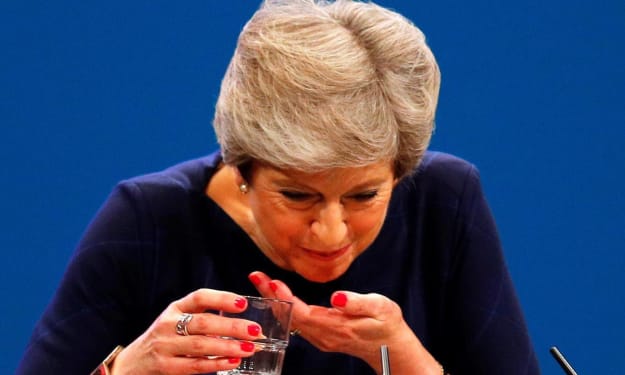
On the 29th March 2017, Theresa May delivered the UK’s official notice of departure from the European Union, triggering article 50 of the Lisbon Treaty. This was in the same week we saw protests in London & Rome against the referendum result.
I have been becoming increasingly concerned with the amount of distraction and propaganda emanating from the press over the following months and believe that people could do with understanding just how to be able to control what happens over the coming months and years
Firstly, regardless of how you voted during the 2016 referendum, it’s over. The count is in and Britain is leaving the EU. Protesting the result, fighting the decision to honour it, or generally slowing the process will do nothing except show the rest of the world that Britain is a divided nation.
Economy
Firstly, there is no reason to panic – Contrary to the rhetoric pushed by Cameron and Osbourne last year, the UK has not plunged into “immediate economic crisis” following the result, or indeed the triggering of article 50. Britain was in-fact the second fastest growing G7 economy in 2016. The financial markets have responded well, with several global banks creating ring-fenced UK banks to ensure a certain insulation from the volatility of the global markets and we have seen a huge rise in the amount of start-up businesses within the Financial Sector with smaller, more agile challenger banks coming to market. This is something I have been incredibly close to, having been involved in the initial recruitment drive of such specialist banks. The reason this is important is that as we have seen capitalism becoming increasingly globalised, we have seen smaller competition pushed out of the market, creating corporate oligarchy’s that start to completely define and dominate their respective industries – This becomes particularly risky within the financial markets as we see huge banking groups acquire more and more smaller banks, increasing their risk of crashing and at the same time, becoming more and more powerful within regulatory and political circles. This in effect means that the larger a banking group becomes, the more control they have over the law that governs them. Smaller, more competitive players within the national banking market will do a huge amount towards increasing the fairness for consumers, and in turn the stability of the UK and European economies.
There are economic aspects that do require the electorate’s focus during Brexit that it is worth being reminded of. Larger corporate bodies will take the opportunity during a lapse in regulation, or in concentration of the regulatory bodies, to drive a new Britain “without the restrictions of excessive regulation. As stressed by Mark Carney at Reuters in Canary Wharf, “The outcome of the Brexit negotiations could prove highly influential in determining which path the global financial system takes”. What he means here is that we have an opportunity to strike a strong regulatory deal with the European Union to ensure that we intelligently regulate our banks in a united fashion – This type of strong agreement will pave the way for strong regulator relationships across industries.
Legislation
With the fears of our world plunging into a dark recession temporarily allayed, we can focus on the facts surrounding the laws and rights that the EU has helped us achieve over the past 40 years. This is also no cause for concern. The PM, in her letter to the European Union, outlined plans for The Great Repeal Bill, a bill whose very purpose is to ensure the United Kingdom has a functioning statute book upon departure from the EU. The way this is to be achieved, is to immediately repeal all EU law, whilst creating new UK versions of the same laws en mass to replace them. The government & opposition will then have the ability to decide and debate which parts of European law they want to keep, and which ones they want to get rid of. This was one of the less-radicalised cornerstones of the Leave campaign – The ability to pick and choose, for ourselves, which laws we were to be governed by.
We will have the very rare and unique opportunity here, to take a long hard look at our legislation, with a view to being able to cherry-pick the very best. This is a once in a lifetime opportunity and as such we must ensure that we are focused on the task at hand. I would ask my fellow “lefties” to draw away from anti-brexit activities to focus on ensuring the left wing is represented in these legislative debates. It would be one of the worst outcomes for the United Kingdom for these changes to be made quickly and quietly whilst half of the country is looking the other way.
We will also have an opportunity here to demand something crucially important for the safe-guarding of human rights and civil liberties for the future. I am suggesting we hold national consultation, with a view to drafting a British Constitution to set in stone the rights and responsibilities of the British People. The government has argued that we don’t need a constitution as we have rights from bills and acts of parliament, but these can be repealed by successive governments. Since the departure of David Cameron as leader of the Conservative Party, this government has repealed large amounts of UK laws around privacy and civil rights, leaving us dependant on the superior EU legislation. Once we are no-longer governed by the EU legislation it will become crucial that we focus on creative viable alternatives to ensure that corporations and governments can’t take advantage of a lack of people’s legal rights.
Trade
When it comes to post-brexit trade, it is important to remember that Britain is a Net-Importer. This means that Britain internationally buys more than it sells of virtually every single commodity. The result of this is that Britain is essentially exporting capital and importing goods from every European country. This is absolutely key to our negotiation process and the future of the nation as a European economic force.
With Britain’s import figure sitting at roughly $581,600,000,000 (6th highest in the world) it’s crucial to understand that this means we are the world’s 6th largest customer. Of that figure, just over $302billion went to the EU. This is significantly more than the EU spends on British goods and services. The rationale behind this argument is that it a lot easier for Britain to adjust its consumption than it is for the EU to adjust its production.
To put this into an example, we can take a look at the German Car market. Britain is the largest importer, globally, of German made cars. If Germany decided to take offence to Brexit and put a tariff on German made vehicles sold to the UK, what would happen?
Firstly, sales of German cars would take an immediate hit due to the rise in prices. Secondly, other manufacturers would see an opportunity to exploit the increase in a competitors pricing and would quickly move to fill the niche created. We have seen anticipation of this already with Asian car manufacturers moving production to Britain to ensure that British made Asian cars can be more competitive than their German counterparts.
What would this mean for British consumers? Well, firstly, there would be less German cars on the road, due to their replacement by cheaper non-German vehicles. Secondly, a market dominated by German imports will be split and divided more equally between more agile competitors.
This logic can be applied across virtually any imported commodity across Europe – What happens if camembert rises in price? We buy cheddar for six months, until the camembert farmers in France have had enough of their government being spiteful over Brexit and demand tariffs are removed.
What happens if the price of a bottle of Champagne is subject to a 10% charge when sold in the UK? We wait 3 months until France realises it’s just stopped its biggest champagne consumer from consuming champagne.
In addition to not being able to be held to ransom by EU member states, we now have the ability to form independent trade agreements with the rest of the world and equally to reject them. Agreements such as TTIP, TTP and TISA seriously threatened democracy and independent sovereignty of nations, and were being pushed through by trade blocks such as the US and the EU for corporate gain. We were beginning to lose our autonomous decision making ability in relation to these huge decisions in the national interest. We again have control over who we trade with, and under what arrangement.
Public Sector Investment
In the lead up to the referendum, the EU’s contribution to the public sector was widely discussed, with figures being misrepresented from both sides and the infamous “Let’s spend it on our NHS” bus.
The fact of the matter is that despite the £4bn rebate, and the money the EU invests in Britain, we are still at a significant deficit, and are one of the few net contributors to the EU Budget.
As mentioned previously, the EU provides development funds, both regional and national within the UK and aims to support production and agriculture within the Union. This, however, does not negate the fact that this is done out of the money the UK has paid the EU for membership.
The bottom line, in respect to money to and from the EU, is that the UK government can retain the capital annually due to the Union. Whilst this means that we will initially lose the support of the EU Regional Development Funds, Grants and other benefits, we are now able to invest our savings as democratically decided. If we wished to continue investing in exactly the same projects as the EU has been, those sectors would not see a negative effect, and we would be better off to the tune of £8.6bn (2016).
This evidences exactly why we need to be vigilant in how our government intends to spend their >£8bn savings. We are now able to asses exactly how this money has been used previously, how efficiently and to vote and petition for adjustments as necessary.
The second benefit from the EU budget divorce is that we can revive investment in British Services organisation, moving away from “Cost-Centric” procurement practices within the Public Sector. With a damning focus on the cost of services tendered, procurement professionals are often forced to place tax-payer funded contracts with the lowest bidder. The down-side of this savings-culture is that the organisations used often carry negative social effects. Public sector organisations often place lengthy, restrictive contracts with global businesses that invest very little back into the UK rather than paying slightly more to use local organisations, therefore driving SME profits in the UK. Jeremy Corbyn has recently addressed the fact that suppliers are often used as “interest free loans” to larger businesses and PLCs, with some years to pay due invoices. Excluding smaller businesses from operating in the public sector ensures that they are trapped within the Private Sector, in essence driving this industry wide culture.
Once Brexit has been completed, we will no longer have to comply with EU Procurement practices and Open Journal of the European Union (OJEU) regulations. As a nation, we can invest tax payers’ money in services and consultancies that provide the best value, rather than the lowest price and will reinvest in the nation. We will, in turn, lose the protection the EU offers us from back-hand deals between the public and private sector, something that has directly fuelled the Revolving-Door culture within government (politicians placing public contracts and agreements with companies they will receive later career opportunities from). It is precisely for this reason that we need to refocus our attention to watching how new procurement regulations are implemented, and ensuring that we don’t allow corruption and self-interest infiltrate our government, council and local services.
Finally, one of my personal triumphs in Brexit, as mentioned previously we can now funnel public sector work to smaller businesses, that have very-little interest in privatising the services they are working for – A local waste management company, supply a WM service to the NHS is not going to want to buy the NHS, yet this is exactly what the EU supported corporate giants are attempting to do.
Immigration
Having debated whether to include a section on this rather touchy subject, I arrived at the conclusion that it would be fundamentally wrong to ignore a major concern of the electorate. This is a subject that has become taboo within the UK, something addressed within my article Political Correctness and I, and I think it’s important that we reopen a rational and frank debate on the subject.
The UK isn’t equipped for mass immigration. We have been struggling through a harsh austerity program that has meant that the poor in Britain are getting poorer, and the public services they depend on are getting axed. This has led to increasing bad-will towards immigration due to the undeniable stress it puts on these services. Whilst the argument that immigrants pay significant amounts into the economy is correct, when the government is cutting public sector budgets, these economic contributions often stay within private sector profit margins.
There has been a very rational argument that free-movement from the EU is, by nature, discriminative. An un-skilled German can live in the UK without the slightest issue, however a qualified doctor from other parts of the world must jump through inordinate amounts of hoops. This is a playing field that we can level almost immediately upon leaving the Union by standardising UK immigration requirements and procedures, ensuring that we have a fair assessment of the contribution people will have on the country. Our independence from the Union will ensure that we are able to quickly adjust these processes, in reaction to global factors and national interest.
I am in no doubt that we now have a fantastic opportunity to introduce fair immigration law that will greatly improve our global reputation and in turn allowing us to cherry-pick the expertise this country needs to fast-track economic, technological and social growth. We do, however, risk allowing right-wing, nationalist feeling to grow within the electorate, especially if we ram home the rhetoric that anyone who has an opinion on immigration that isn’t “free movement” is a racist. This is a key reason to reopen rational debate around the immigration issue
Brexit will be one of the Britain’s defining moments of the 21st century. There are, of course, huge areas of concern during these uncertain times as the nation takes an uncharted course through choppy waters, however where there is hardship there is almost always opportunity. It is now down to us, as a nation and as individuals to ensure our voices are heard in deciding what we want from a Post-Brexit Britain.
About the Creator
Jordan Catto
Late Twenties Lefty Gardener - Writing about the planet, plants and other stuff






Comments
There are no comments for this story
Be the first to respond and start the conversation.